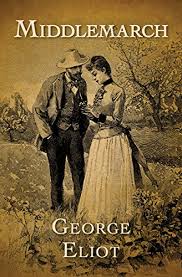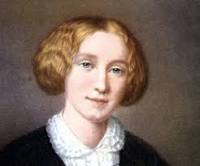Middlemarch Page #21
Middlemarch, A Study of Provincial Life is a novel by the English author George Eliot, appearing in eight instalments in 1871 and 1872. Set in a fictitious Midlands town from 1829 to 1832, it follows distinct, intersecting stories with many characters.
“Humphrey! I have no patience with you. You know you would rather dine under the hedge than with Casaubon alone. You have nothing to say to each other.” “What has that to do with Miss Brooke’s marrying him? She does not do it for my amusement.” “He has got no good red blood in his body,” said Sir James. “No. Somebody put a drop under a magnifying-glass and it was all semicolons and parentheses,” said Mrs. Cadwallader. “Why does he not bring out his book, instead of marrying,” said Sir James, with a disgust which he held warranted by the sound feeling of an English layman. “Oh, he dreams footnotes, and they run away with all his brains. They say, when he was a little boy, he made an abstract of ‘Hop o’ my Thumb,’ and he has been making abstracts ever since. Ugh! And that is the man Humphrey goes on saying that a woman may be happy with.” “Well, he is what Miss Brooke likes,” said the Rector. “I don’t profess to understand every young lady’s taste.” “But if she were your own daughter?” said Sir James. “That would be a different affair. She is not my daughter, and I don’t feel called upon to interfere. Casaubon is as good as most of us. He is a scholarly clergyman, and creditable to the cloth. Some Radical fellow speechifying at Middlemarch said Casaubon was the learned straw-chopping incumbent, and Freke was the brick-and-mortar incumbent, and I was the angling incumbent. And upon my word, I don’t see that one is worse or better than the other.” The Rector ended with his silent laugh. He always saw the joke of any satire against himself. His conscience was large and easy, like the rest of him: it did only what it could do without any trouble. Clearly, there would be no interference with Miss Brooke’s marriage through Mr. Cadwallader; and Sir James felt with some sadness that she was to have perfect liberty of misjudgment. It was a sign of his good disposition that he did not slacken at all in his intention of carrying out Dorothea’s design of the cottages. Doubtless this persistence was the best course for his own dignity: but pride only helps us to be generous; it never makes us so, any more than vanity makes us witty. She was now enough aware of Sir James’s position with regard to her, to appreciate the rectitude of his perseverance in a landlord’s duty, to which he had at first been urged by a lover’s complaisance, and her pleasure in it was great enough to count for something even in her present happiness. Perhaps she gave to Sir James Chettam’s cottages all the interest she could spare from Mr. Casaubon, or rather from the symphony of hopeful dreams, admiring trust, and passionate self devotion which that learned gentleman had set playing in her soul. Hence it happened that in the good baronet’s succeeding visits, while he was beginning to pay small attentions to Celia, he found himself talking with more and more pleasure to Dorothea. She was perfectly unconstrained and without irritation towards him now, and he was gradually discovering the delight there is in frank kindness and companionship between a man and a woman who have no passion to hide or confess. CHAPTER IX. 1st Gent. An ancient land in ancient oracles Is called “law-thirsty”: all the struggle there Was after order and a perfect rule. Pray, where lie such lands now? . . . 2d Gent. Why, where they lay of old—in human souls. Mr. Casaubon’s behavior about settlements was highly satisfactory to Mr. Brooke, and the preliminaries of marriage rolled smoothly along, shortening the weeks of courtship. The betrothed bride must see her future home, and dictate any changes that she would like to have made there. A woman dictates before marriage in order that she may have an appetite for submission afterwards. And certainly, the mistakes that we male and female mortals make when we have our own way might fairly raise some wonder that we are so fond of it. On a gray but dry November morning Dorothea drove to Lowick in company with her uncle and Celia. Mr. Casaubon’s home was the manor-house. Close by, visible from some parts of the garden, was the little church, with the old parsonage opposite. In the beginning of his career, Mr. Casaubon had only held the living, but the death of his brother had put him in possession of the manor also. It had a small park, with a fine old oak here and there, and an avenue of limes towards the southwest front, with a sunk fence between park and pleasure-ground, so that from the drawing-room windows the glance swept uninterruptedly along a slope of greensward till the limes ended in a level of corn and pastures, which often seemed to melt into a lake under the setting sun. This was the happy side of the house, for the south and east looked rather melancholy even under the brightest morning. The grounds here were more confined, the flower-beds showed no very careful tendance, and large clumps of trees, chiefly of sombre yews, had risen high, not ten yards from the windows. The building, of greenish stone, was in the old English style, not ugly, but small-windowed and melancholy-looking: the sort of house that must have children, many flowers, open windows, and little vistas of bright things, to make it seem a joyous home. In this latter end of autumn, with a sparse remnant of yellow leaves falling slowly athwart the dark evergreens in a stillness without sunshine, the house too had an air of autumnal decline, and Mr. Casaubon, when he presented himself, had no bloom that could be thrown into relief by that background. “Oh dear!” Celia said to herself, “I am sure Freshitt Hall would have been pleasanter than this.” She thought of the white freestone, the pillared portico, and the terrace full of flowers, Sir James smiling above them like a prince issuing from his enchantment in a rose-bush, with a handkerchief swiftly metamorphosed from the most delicately odorous petals—Sir James, who talked so agreeably, always about things which had common-sense in them, and not about learning! Celia had those light young feminine tastes which grave and weatherworn gentlemen sometimes prefer in a wife; but happily Mr. Casaubon’s bias had been different, for he would have had no chance with Celia. Dorothea, on the contrary, found the house and grounds all that she could wish: the dark book-shelves in the long library, the carpets and curtains with colors subdued by time, the curious old maps and bird’s-eye views on the walls of the corridor, with here and there an old vase below, had no oppression for her, and seemed more cheerful than the casts and pictures at the Grange, which her uncle had long ago brought home from his travels—they being probably among the ideas he had taken in at one time. To poor Dorothea these severe classical nudities and smirking Renaissance-Correggiosities were painfully inexplicable, staring into the midst of her Puritanic conceptions: she had never been taught how she could bring them into any sort of relevance with her life. But the owners of Lowick apparently had not been travellers, and Mr. Casaubon’s studies of the past were not carried on by means of such aids.
Translation
Translate and read this book in other languages:
Select another language:
- - Select -
- 简体中文 (Chinese - Simplified)
- 繁體中文 (Chinese - Traditional)
- Español (Spanish)
- Esperanto (Esperanto)
- 日本語 (Japanese)
- Português (Portuguese)
- Deutsch (German)
- العربية (Arabic)
- Français (French)
- Русский (Russian)
- ಕನ್ನಡ (Kannada)
- 한국어 (Korean)
- עברית (Hebrew)
- Gaeilge (Irish)
- Українська (Ukrainian)
- اردو (Urdu)
- Magyar (Hungarian)
- मानक हिन्दी (Hindi)
- Indonesia (Indonesian)
- Italiano (Italian)
- தமிழ் (Tamil)
- Türkçe (Turkish)
- తెలుగు (Telugu)
- ภาษาไทย (Thai)
- Tiếng Việt (Vietnamese)
- Čeština (Czech)
- Polski (Polish)
- Bahasa Indonesia (Indonesian)
- Românește (Romanian)
- Nederlands (Dutch)
- Ελληνικά (Greek)
- Latinum (Latin)
- Svenska (Swedish)
- Dansk (Danish)
- Suomi (Finnish)
- فارسی (Persian)
- ייִדיש (Yiddish)
- հայերեն (Armenian)
- Norsk (Norwegian)
- English (English)
Citation
Use the citation below to add this book to your bibliography:
Style:MLAChicagoAPA
"Middlemarch Books." Literature.com. STANDS4 LLC, 2024. Web. 25 Nov. 2024. <https://www.literature.com/book/middlemarch_242>.




Discuss this Middlemarch book with the community:
Report Comment
We're doing our best to make sure our content is useful, accurate and safe.
If by any chance you spot an inappropriate comment while navigating through our website please use this form to let us know, and we'll take care of it shortly.
Attachment
You need to be logged in to favorite.
Log In